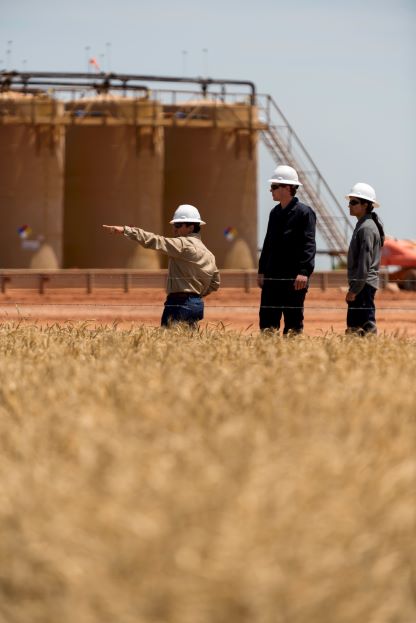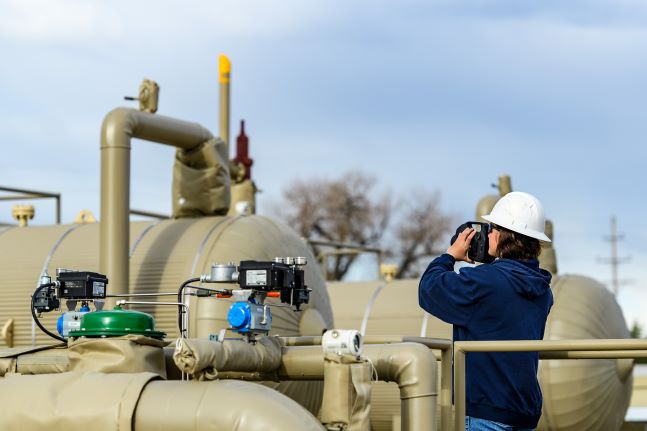Anchal Liddar is senior vice president of Global Industry Services at the American Petroleum Institute.
The natural gas and oil industry stands at a crossroads of two compelling global imperatives: promote energy security to meet the world’s increasing demand for reliable energy; and protect the environment by addressing climate change concerns. While some might frame these in partisan tones, focusing on one-sided agendas, at the American Petroleum Institute (API), we recognize these issues are connected and as such, must be pursued concurrently. Both present very real and exigent needs.
For instance, population is rising, energy demand is increasing and geopolitical conflicts are escalating. These factors make energy security a critical concern, as it is fundamental to national security, economic growth and myriad societal factors. At the same time, environmental concerns are growing, and we recognize our role in addressing them, especially those related to climate action.
Our approach has been to implement innovative strategies and practices that address both considerations, a dual focus that we pursue through the development and application of rigorous standards.
The dual imperative
We accomplish that by publishing world-class standards that provide detailed industry guidelines addressing safety, sustainability, environmental protection and security. For more than a century, our 800+ consensus-developed standards have been the foundation of industry operations around the world, a legacy of excellence whose focus has continually evolved to meet the needs and expectations of industry and the public.

This includes a significant focus on improving environmental performance and reducing greenhouse gas (GHG) emissions, for which we have published nearly 100 standards. In the past three years alone, we have published nearly 60 standards directly contributing to reductions in GHG emissions, targeting flaring and leaks from extraction, manufacturing and transport, all of which help to mitigate risks related to climate change.
Recently, API members codified their commitment to environmental stewardship with the launch of API Energy Excellence program, where members commit to applying 13 core elements to safeguard employees, the environment and the communities where they operate. Commitment to the program provides assurance to continuous improvement across all segments of the industry, from drilling and extraction to transport and refining.
The results of these and other efforts have been profound. Between 2005 and 2023, the United States reduced CO2 emissions more than any other country in the world, made possible by the increased use of natural gas, according to testimony presented to the House Committee on Energy and Commerce last year. This is a testament to our dual commitment to secure the world’s energy supply responsibly while enhancing environmental protection, applying globally recognized standards that are continuously improved and enhanced.
Innovative initiatives

A foundation for this transformation is API’s Climate Action Framework, which is API’s roadmap to address the dual energy and climate challenges, including accelerating technological innovation and advancing cleaner fuels. These are accomplished in part through the development of API standards, which are instrumental to facilitating the commercialization of new technologies, including hydrogen and carbon capture.
For instance, API 1509, Engine Oil Licensing and Certification System, 22nd edition, helps ensure that engine components work optimally. It helps improve fuel economy and maintains a vehicle’s environmental and pollution controls by keeping a vehicle’s emissions control systems optimized. API 521, Pressure-relieving and Depressuring Systems, and API 537, Flare Details for Petroleum, Petrochemical and Natural Gas Industries, provide guidance for flare design requirements, helping to reduce flaring and lower CO2 emissions by improving flare efficiency.
LNG has become a viable energy source predicated on security and reduced emissions, as it allows countries to diversify their energy sources to reduce their dependence on a single supplier. After Russia reduced its flow of natural gas to European nations allied with Ukraine, the United States stepped in, increasing LNG exports by 141% from 2021 to 2022.
While ensuring energy security is critical, so, too, is environmental responsibility. And for LNG, the science is clear: Using natural gas instead of coal significantly reduces emissions, including air pollutants and CO2. It’s not just about meeting needs; it’s about doing so responsibly while continuously working to improve environmental performance.
API’s approach includes a focus on both processes and products. Advanced engine oils, carbon capture technologies and hydrogen are major contributors in lowering emissions. Additionally, cross-industry partnerships with technical experts, environmental groups and other stakeholders have led to important knowledge sharing on cleaner technologies and information that helps drive both new and revised standards.
Through innovation and the application of established scientific principles, API is shaping a future where both energy security and environmental stewardship are achievable.
Back to the future
As the world confronts the dual challenges of securing reliable energy and protecting the environment, API is demonstrating how collaboration, innovation and a commitment to sustainability can produce progress that’s both significant and relevant.
While the challenge is complex and ongoing, a balanced approach offers the most practical and effective path forward, meeting the world’s growing energy demands while achieving meaningful environmental goals.
Recommended Reading
E&P Highlights: Jan. 6, 2025
2025-01-06 - Here’s a roundup of the latest E&P headlines, including company resignations and promotions and the acquisition of an oilfield service and supply company.
PotlatchDeltic Enters Lithium, Bromine Lease Agreement in Arkansas
2025-02-06 - PotlatchDeltic’s agreement with gives Tetra Brine Leaseco covers about 900 surface acres in Lafayette County, PotlatchDeltic says.
E&P Highlights: Dec. 30, 2024
2024-12-30 - Here’s a roundup of the latest E&P headlines, including a substantial decline in methane emissions from the Permian Basin and progress toward a final investment decision on Energy Transfer’s Lake Charles LNG project.
Huddleston: Haynesville E&P Aethon Ready for LNG, AI and Even an IPO
2025-01-22 - Gordon Huddleston, president and partner of Aethon Energy, talks about well costs in the western Haynesville, prepping for LNG and AI power demand and the company’s readiness for an IPO— if the conditions are right.
E&P Highlights: Jan. 21, 2025
2025-01-21 - Here’s a roundup of the latest E&P headlines, with Flowserve getting a contract from ADNOC and a couple of offshore oil and gas discoveries.
Comments
Add new comment
This conversation is moderated according to Hart Energy community rules. Please read the rules before joining the discussion. If you’re experiencing any technical problems, please contact our customer care team.





